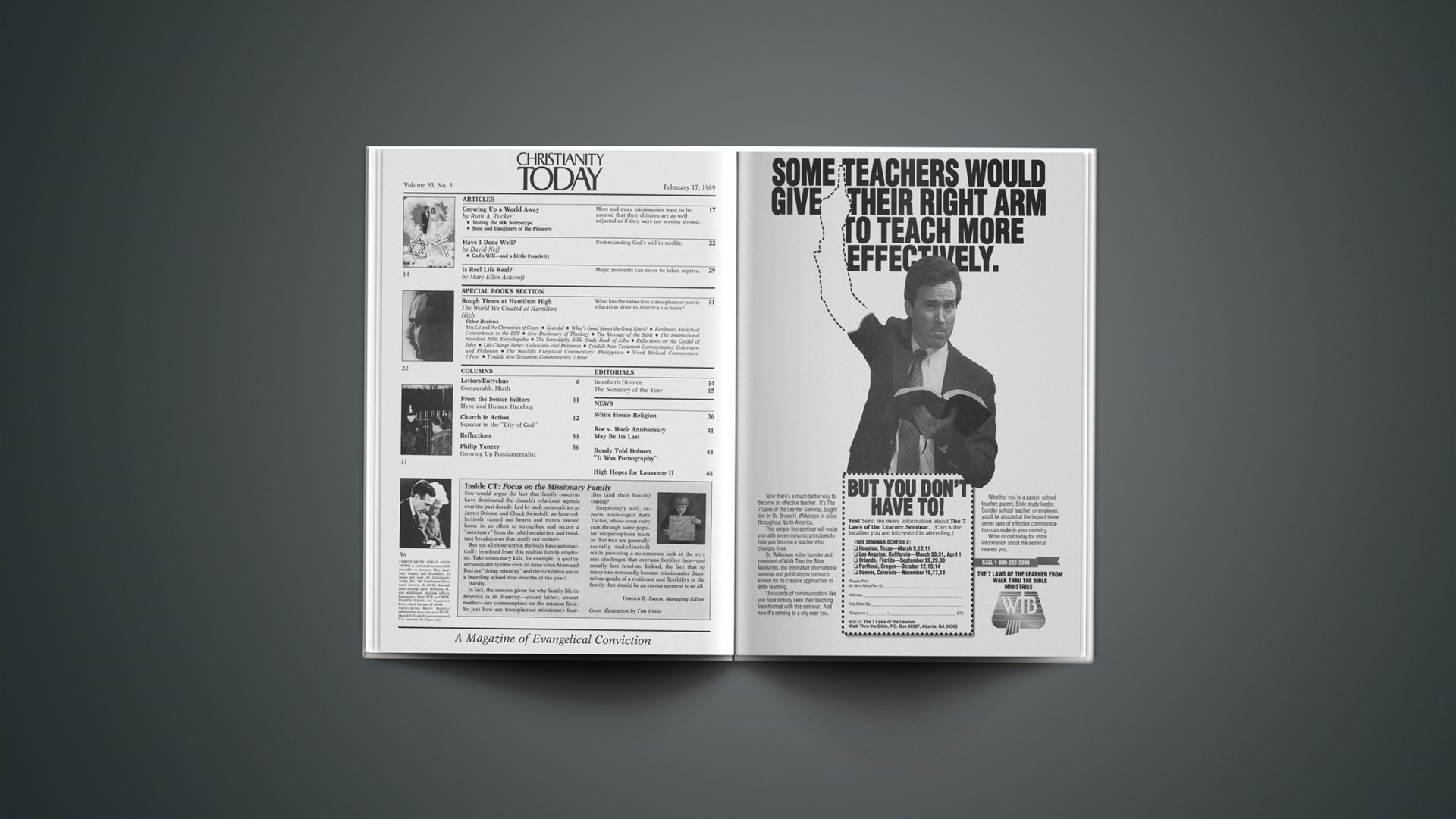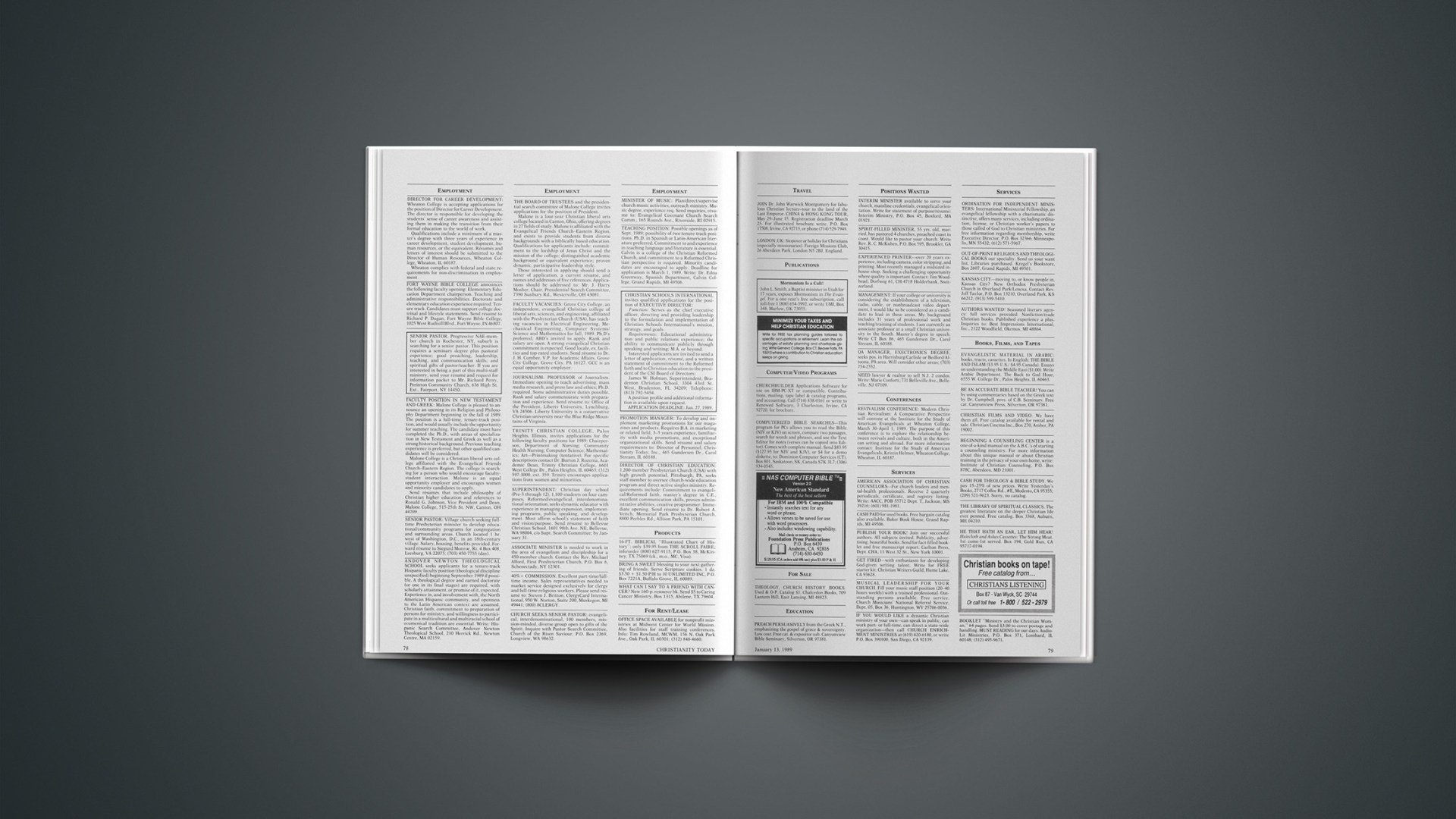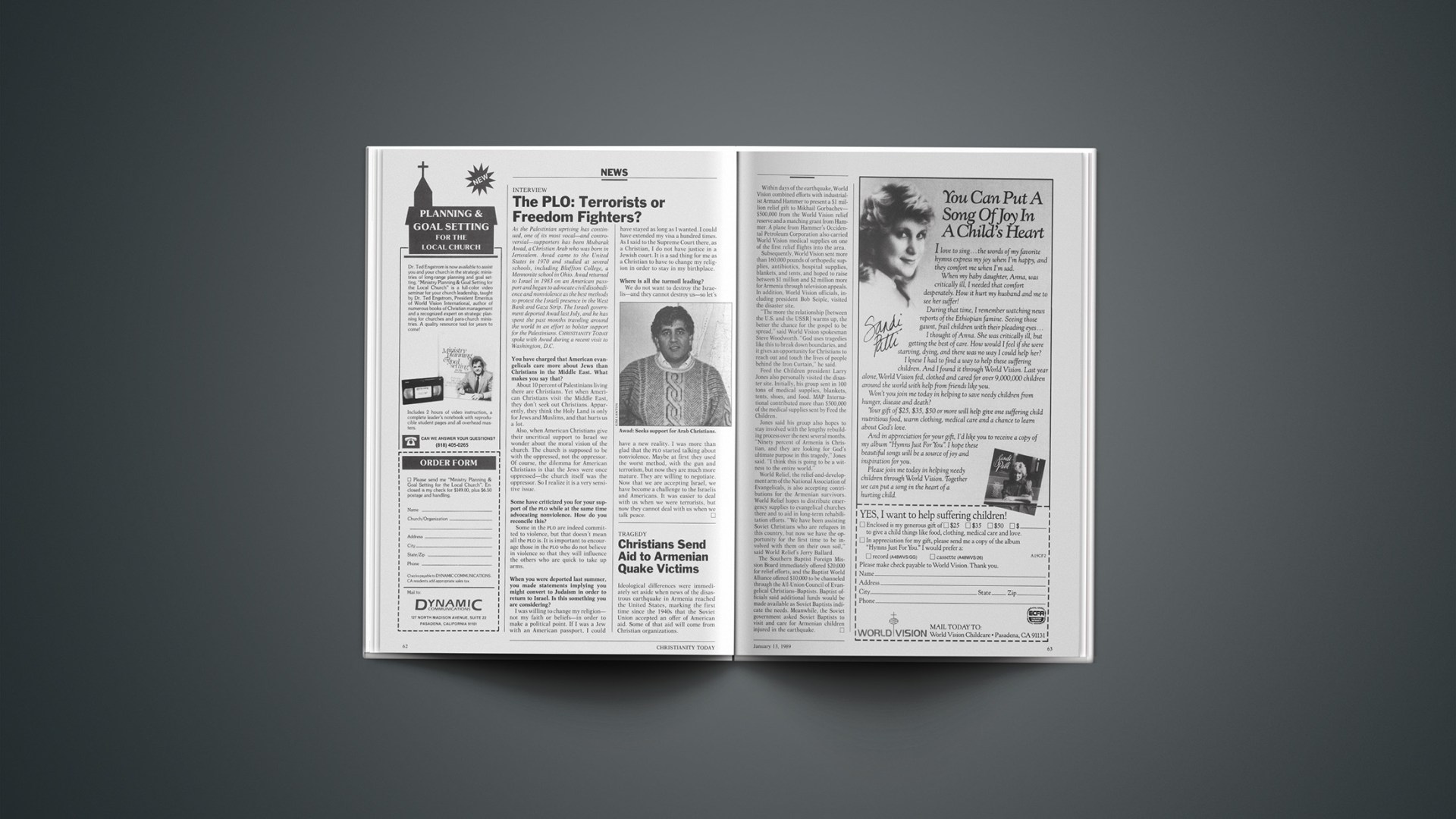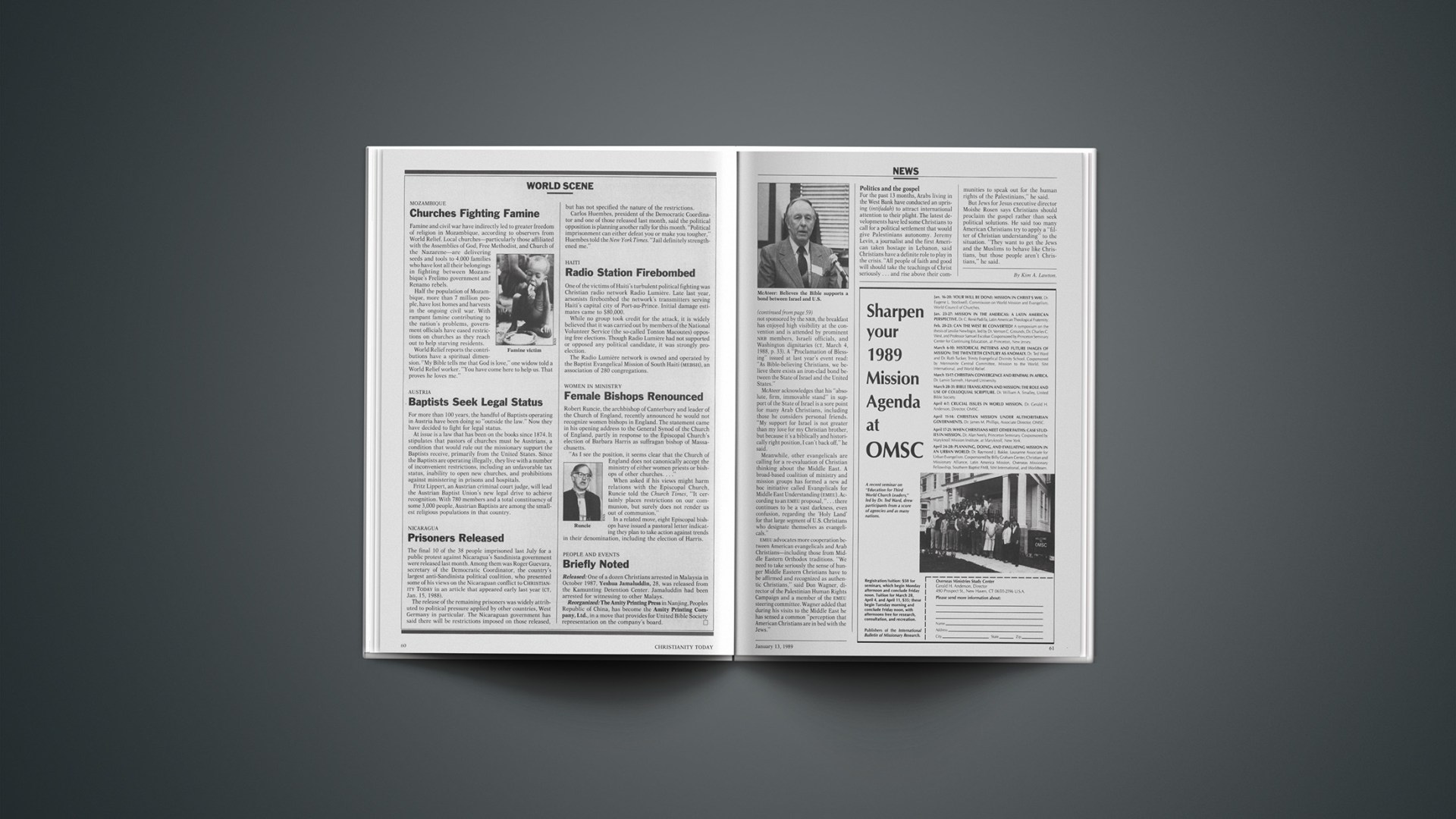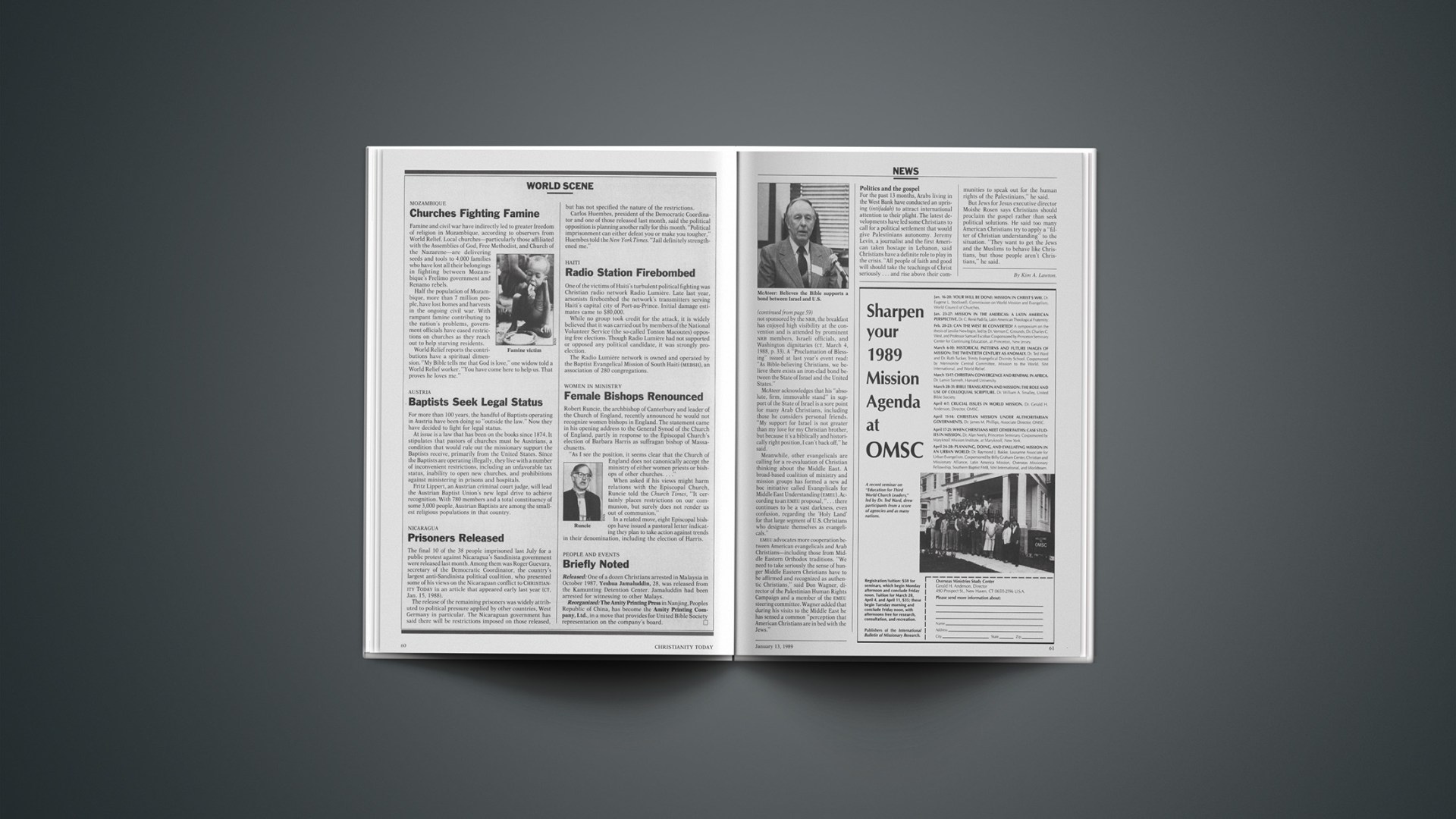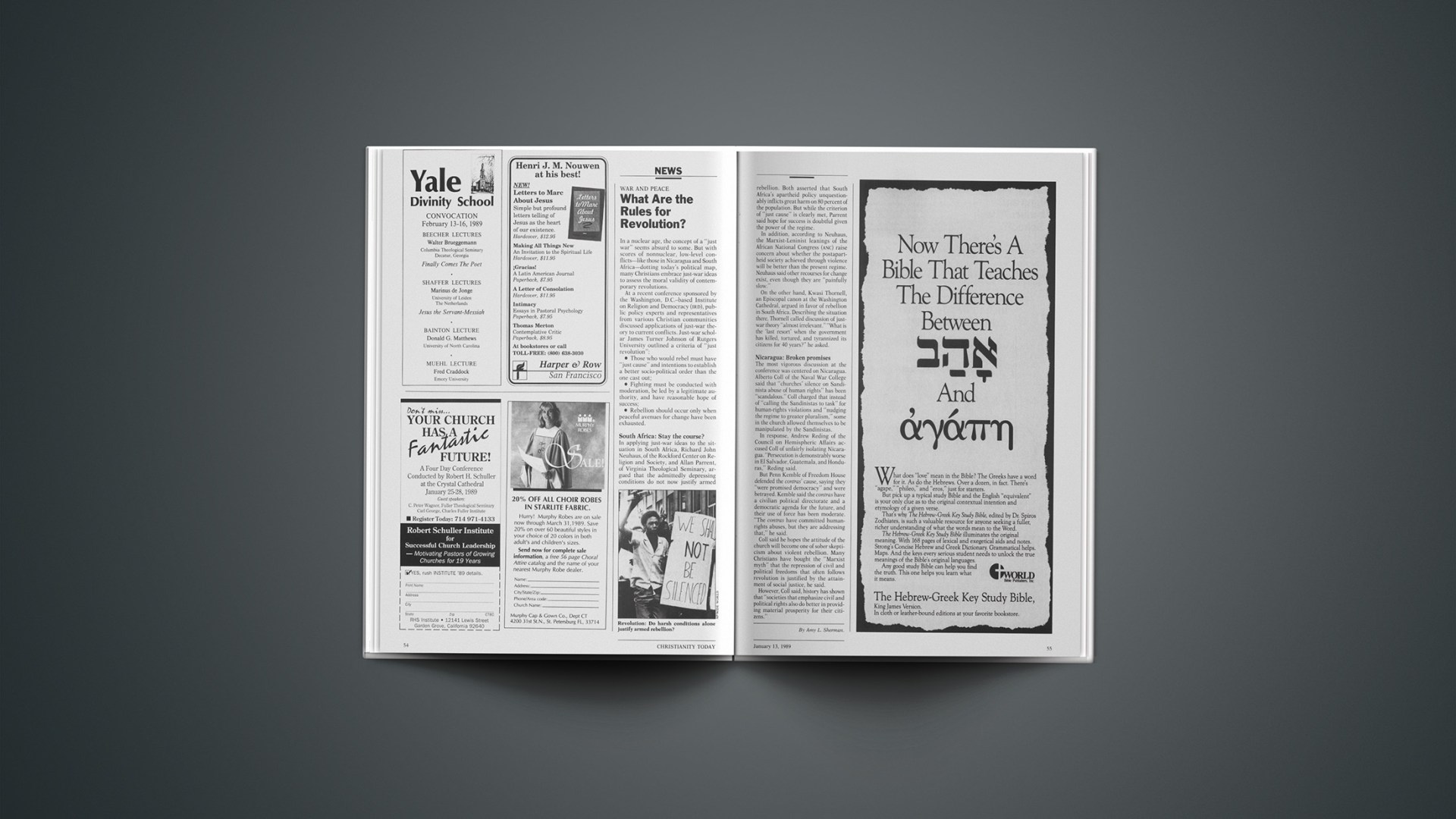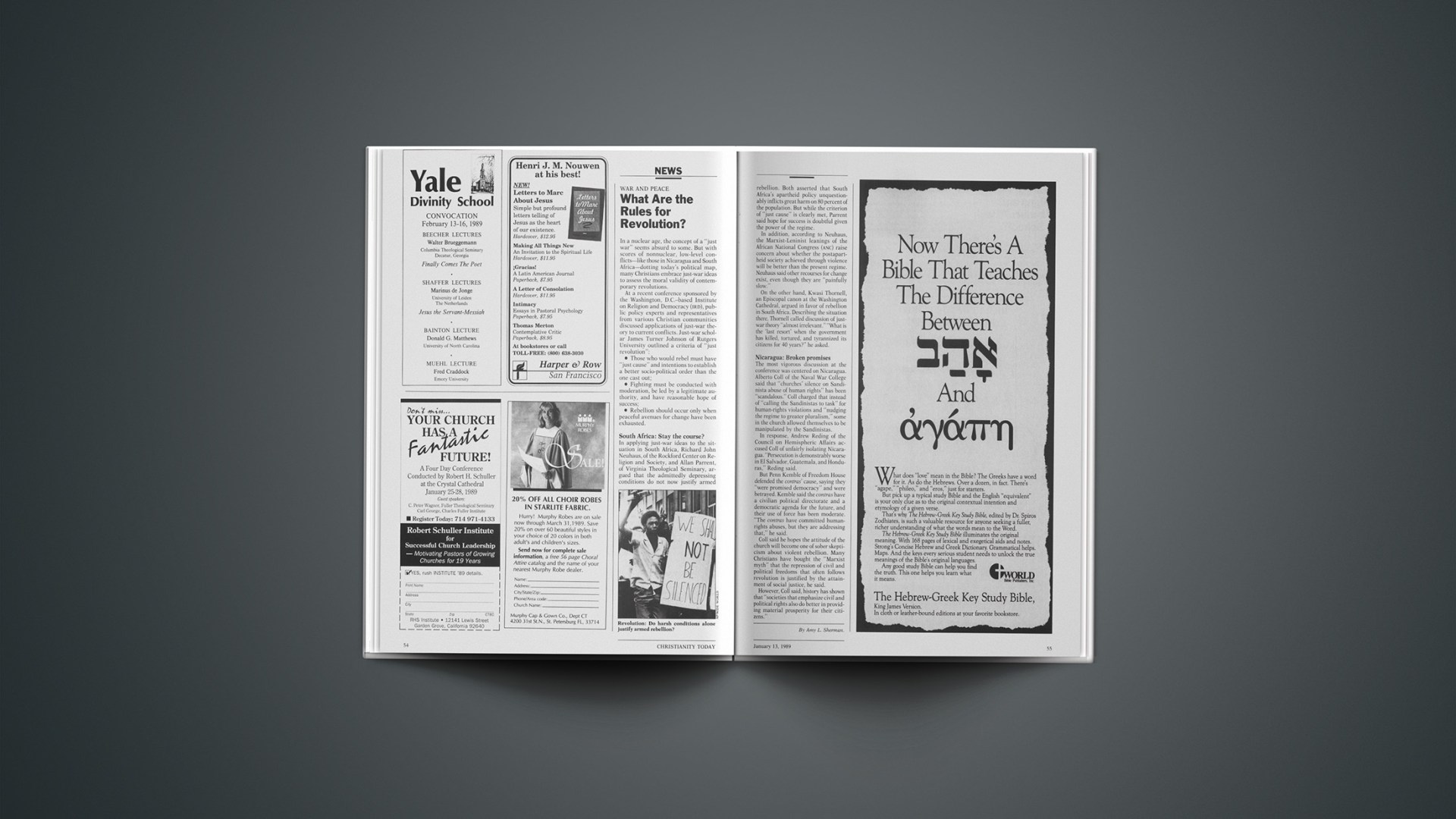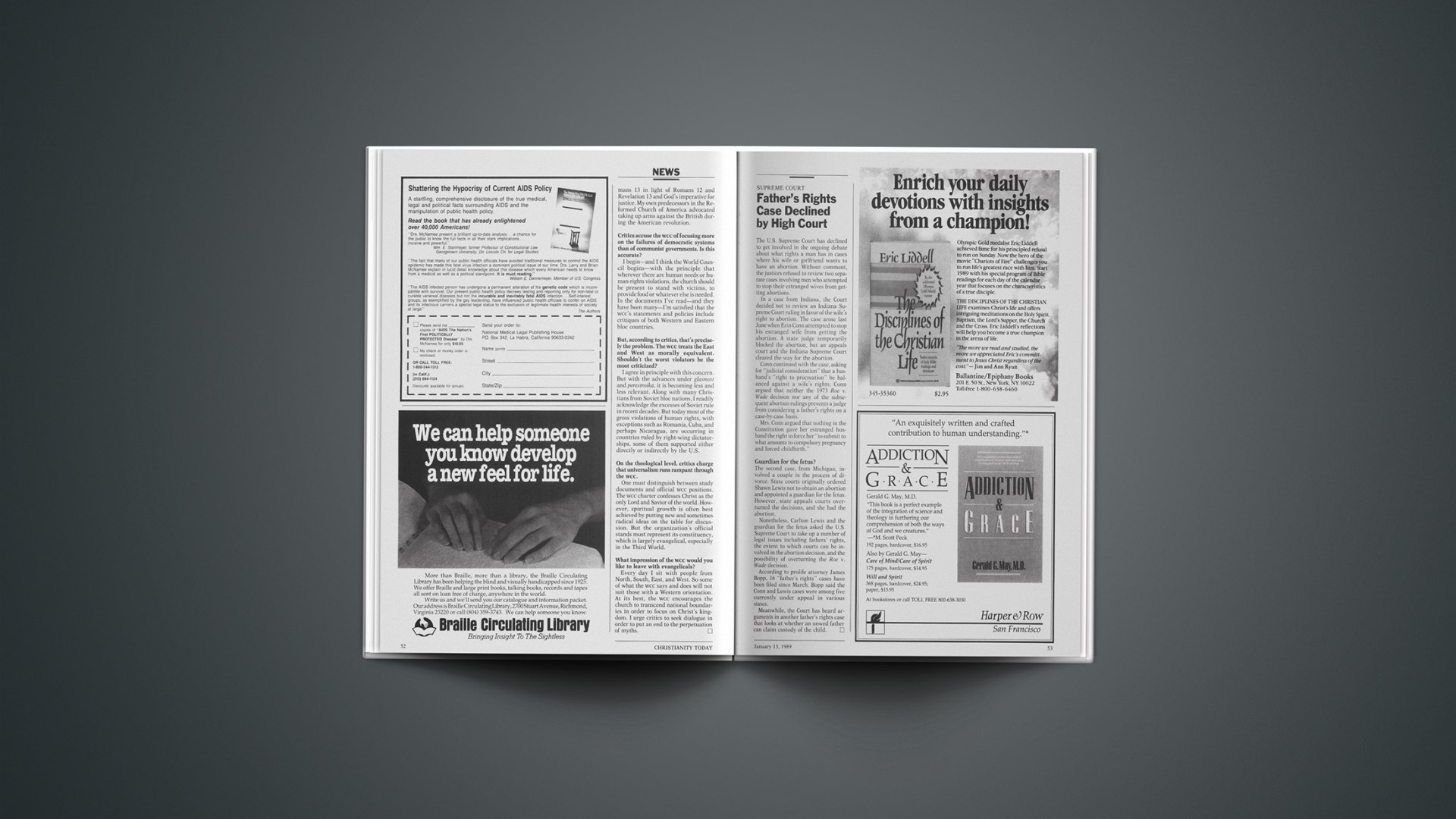Discomfiting, But Necessary
I want to thank you and Mary Ellen Ashcroft for her writing and your publishing her article, “Away from the Manger” [Dec. 9], It did not make me comfortable, but I needed to hear what she had to say. Ashcroft was “right on.”
Rev. Willard S. Fenderson
Prineville Community Church
Prineville, Oreg.
What a gloomy, guilt-ridden view of the second advent of Christ! Even the illustration from Dore was foreboding. There was no word of the grace of God, nor of happiness, nor of comfort. If I had such a unilateral view, I would dread rather than joyfully long for his appearing.
Donald Kopecky
Longmont, Colo.
Ashcroft was brutally harsh, I believe, and not altogether accurate. Thoughtful Christians have always placed the manger infant in perspective to the mature Christ, Savior, Redeemer, and crucified, resurrected, returning, conquering King. All that is so much a part of the excitement of celebrating his birth. With joy we buy and wrap and give and feast and love—it is the greatest birthday we can ever celebrate.
Velma Criswell Redelfs
Bellingham, Wash.
Objectionable Language
Charles Colson is to be commended for his refusal to “salute” the feminist linguistic flag when he is ordered to drop the use of “man” and “mankind” in referring to humans generally [“Inclusive Anguish,” Dec. 9]. In God’s sight, there is nothing wrong with using the same word to refer to human beings generally and to males specifically because, in causing Scripture to be written, God himself used languages that do just that. In the Hebrew Old Testament the word ‘adam, “man,” means either “male person” or “the human race,” and in the Greek New Testament the word anthrōpos, “man,” can take either sense as well. If we say such use of language is inherently morally objectionable, we will have to say that Scripture does something morally objectionable. And that I will not do.
Wayne Grudem, Ph.D.
Trinity Evangelical Divinity School
Deerfield, Ill.
Colson resents being called a bigot, which he claims he is not, but he can’t understand why women resent being called “men,” which they claim they are not.
Karen Hiner
Colorado Springs, Colo.
If Colson thinks changing biblical references of “men” into “people” is a problem, he should try changing “Our Father” to “Our Mother.” This issue is far more crucial to the future of the church. It is one that addresses how we relate to God, and how God revealed himself to humanity. God connects with us as “Father,” the term that he gave us, and this is a concept which human beings can relate to.
If all I had to worry about in my church with regard to people was inclusive language, I would be thrilled!
Neil McKay Mancor
Vancouver, B.C., Canada
In the heat of his ire at having been dealt with rudely and inappropriately by “overzealous” conference leaders, it seems to have escaped Colson’s notice that the very fact that “man” means both “male” and “human” indicates a presupposed male dominance of humanity. No doubt Colson himself would feel slighted if he entered a female-dominated culture and heard himself referred to generically as “woman.”
Perhaps Colson wants our language to reflect what be believes about “the order of the universe”—namely, that men are to exercise a God-ordained authority over women in the church and the home. Perhaps he is not even willing to consider that his view of “gender distinctions” may include some nonbiblical cultural baggage that could well deserve some careful, impartial reexamination.
Becky Merrill Groothuis
Seattle, Wash.
Language, as Colson notes, is a powerful tool. It is also subject to change. Use of the masculine as an inclusive does call forth primarily male imagery, thereby excluding from the mind’s eye at least half the population. The use of gender-neutral language would cause men to relinquish some of the power and privilege that has formerly been theirs. It would also enable women to develop a self-concept as true image-bearers of God and not merely a subclass. This is a worthy Christian goal.
Lois Leader
Phoenix, Ariz..
When speaking of a group of people consisting of men and women I prefer to use mortals instead of mankind. And I feel perfectly at ease doing so.
Herbert A. Kliewer
Wichita, Kan.
Letter Of The Law—Or Morality?
Gary Hardaway’s “No Pardon for North” [Speaking Out, Dec. 9] presupposes, as the author himself acknowledges, that North is guilty—of violating the Boland Amendment, he says. Nonsense. The Boland Amendment was, as Patrick Buchanan wrote in his column of December 10, “a civil statute; it did not apply to foreign governments; it did not apply to third parties; it did not apply to the NSC (National Security Council); and Adm. Poindexter and Col. North did not violate it.”
Hardaway asks, “Didn’t North misappropriate several millions of dollars that didn’t belong to him? Well, it appears so.” What he doesn’t say is that North’s “misappropriation,” if that is the correct word, was not for himself but for the fight for freedom in Central America. The difference between North’s kind of “misappropriation” and what is suggested by Hardaway’s words is that of night and day. His phraseology suggests guilt, obscuring the fact that the money had not been stolen but simply redirected into a fight for justice and freedom. Even if his actions bent the law a bit they were more moral than those of our congressmen, who, in effect, betrayed us all by refusing aid to the Nicaraguan Democratic Resistance Fighters.
Hardaway is interested more in the letter of the law than in morality, seemingly unaware that what is illegal may on occasion not be immoral. His sons will find out that in real life things are not always black and white, not quite so abstractly simple-minded as painted by their father in his rationalizations for not pardoning North.
Charles L. King
Boulder, Colo.
Hardaway has expressed the thoughts of someone who values the kingdom of God (which steadfastly promotes righteousness and justice) over the kingdom of the United States (which selectively promotes justice or economic and political dominion over others). Give him an A in Christian citizenship.
Lewis Hodge
Knoxville, Tenn.
It was shocking to read Hardaway’s admission: “My comments have presumed that North is guilty. Perhaps he is innocent.” Perhaps, indeed! There hasn’t even been a trial yet. What has happened in today’s world to the presumption of innocence until proven guilty?
Constance Walker
Houston, Tex.
Many of those who have rushed to North’s defense have been blinded to the fact that the Constitution is not defended and democracy is not advanced when a small group of people (allegedly) violate that Constitution and lie to the democratically elected House of Congress.
Rev. Loring Prest
Norway, Mich.
Addiction’S Multilevel Nature
It was refreshing to read Richard Mouw’s answers to questions on addiction. (“Getting Free,” CT Institute, Dec. 9). For too long we have been confronted with polarized views of this subject: sin versus the disease concept. Here Mouw reconciles these opposing views in clear biblical terms. Let’s be honest: the 12-step (AA) process has been for over 40 years, and in more recent years for other addicts, the primary successful recovery concept for alcoholics. However, many Christian leaders have opposed this seemingly secular route to recovery, not understanding, as Mouw explains, the multilevel nature of addiction.
Certainly the sin of addiction must be spiritually dealt with. But only when the chemical and psychological and other elements of the problem are addressed does the addict find his way into a state of recovery.
Walter R. Peterson
Huntsville, Ala.
I helped start a Recovery Thru Christ group in our church a year ago because of a need in our community. I attended the group though I had no addiction problem myself. I soon saw that we all have the same basic root problem—sin; and anyone recognizing their sin problem would fit right into our group and benefit from it. This approach to life’s problems often helps individuals face reality as few Christian groups seem to do. Thank you for bridging the gap between AA and Christianity that has long needed to be bridged.
Mrs. Carolyn Lilley
Parsons, Kan.
Perhaps the current use of the disease model for a whole series of problems subsumed under the generic title of addictions is because it is financially rewarding. It is perhaps no coincidence that approximately the same time as we began to suffer from a glut of graduates from medical school, a whole new class of disease began to emerge. By referring to these social ills as medical problems, we placed them under the umbrella of third-party reimbursement.
I am a recovered alcoholic and a longtime mental health professional. I know personally and professionally that the medical model removes the very factor that decreases recidivism—personal responsibility for changing the manner in which one deals with life. I have found that those who come to terms with the underlying causality that led them to be abusers tend not to return for additional inpatient stays in treatment facilities. Those who do not, quite frequently return for additional inpatient stays or at best become “sober/clean” alcoholics/drug addicts, etc., living the rest of their lives one small step away from disaster because the causal issues never get addressed.
R. L. Sharp, Ph.D.
Christian Clinical Counseling
Albuquerque, N.M.
A sentence read: “No one is sure where the 12 steps came from.” I beg to differ. The steps were made up by Bill Wilson and Dr. Bob Smith, who started Alcoholics Anonymous between 1935 and 1939, when the first AA book was printed. There were 6 steps at first, taken from the Bible; then they became the 12 steps used today by many more anonymous groups than AA.
Mrs. Ola Mary Frey
Phoenix, Ariz.
Love, Not Legislation
As you so correctly point out in your editorial, “The Human Pesticide” [Dec. 9], the abortion drug RU 486 may someday be implicated, as was thalidomide, in birth defects and other harmful side effects. Anti-abortion forces must share the responsibility of any such health risks if their efforts to outlaw safe abortions succeed. Rather than picketing abortion clinics and the like, those who are truly dedicated to the sanctity of life should concentrate on showing love to women experiencing crisis pregnancies.
Daniel L. Diaz
Cleveland Heights, Ohio
RU 486 provides us with a fresh opportunity to assess the entire gamut of contraceptive technologies as we realize that the French “abortion pill” isn’t the new wonder drug some might claim it to be. Mifepristone is just a reformulation of the same old products, not entirely different in kind from its predecessors but more alarming because of its difference in degree. If we say we believe that life begins at conception, then let’s be honest about the drugs and devices already available for women’s use that can act to destroy a life barely begun. When selecting a method of birth control we must ask physicians point blank: “Does this method work solely by acting to prevent fertilization, or does it prevent the establishment of pregnancy in other ways as well?”
Debra Evans
Lincoln, Neb
Innocent Victims?
“Mending God’s Lonely Warriors” [News, Dec. 9] revealed that mission methods, especially in the area of “recruiting,” need an overhaul. The Moroneys are innocent victims of certain traditional missionary methods that have scarred, if not ruined, hundreds of young married Christian couples. In addition, if Jim Reapsome is correct (“in some cases the dropout rate for missionaries is as high as 30 percent.”), the waste of mission dollars is staggering.
My advice to Ed Moroney is to stay in the U.S., get involved in a good local church, and give God time to heal and mature his marriage. Learn how to love, minister to, and protect your wife from zealous missionary leaders. God is not in as big a hurry as your mission board to put you back on “the field.” He has higher priorities in your life.
Rev. Henry E. Jones
Spiritual Overseers Service
Irvine, Calif.
“Lite Sin”—and Other Words Worth Watching
A few new words for your evangelical dictionary:
Byelines: The third verses of hymns that are skipped over in congregational singing.
Guestimony: The salvation story of a once particularly lewd character. These visiting speakers are especially popular in churches where there are no “deep” sinners (see Lite Sin).
Hello-ship: Shallow conversation in church lobbies; often mislabeled as “fellowship.”
Lite Sin: Sin with one-third less disapproval than other leading sins. Antonym: “deep sin.”
McMessage: A fast-paced, slickly packaged talk that has little real nutritional value. To place an order, just say: “Pastor, could you please say a few words?”
Pastornoia: An overwhelming fear that the pastor will: (a) visit your home while you’re listening to Twisted Sister; (b) see you on your way to the beach on Sunday morning; (c) ask you to pray in public.
Tele-vision: Spiritual insight given to evangelists who need money.
EUTYCHUS
SPEAKING OUT
What Would Jesus Do About AIDS?
About three years ago, my wife and I watched an evening news story about a woman who had contracted AIDS through a blood transfusion. They showed her living a normal life, even attending church. As the cameras rolled at the end of the service, the people of her little church hugged her and told her they were praying for her.
“I never want to touch a person with AIDS!” I exclaimed to my wife. “How can those people be sure they won’t get it?” Like many others at the time, I thought AIDS could be transmitted through casual contact.
One year later, a phone call changed everything I had ever thought or felt about the disease. My brother Jerry had AIDS.
I had had my suspicions. The previous year he had been ill on several occasions and remained unusually weak. And I knew he had been involved in homosexuality. But nothing could have prepared me for such news.
My “perfect Christian family” and I were forced to face ourselves: imperfect, disconnected, and full of pain. Reality was not easy to accept. We struggled to meet the challenge.
Out of Christlike compassion my wife invited Jerry to stay with us. It was not a decision to which I willingly agreed. I was scared for all of us. I called and wrote every agency I could to learn the precautions I should take. Not one thought went toward my brother’s feelings and struggle. I was totally centered on protection and self-preservation and what people would think. Not once did I ask, “What would Jesus do?”
Jesus would have hugged the woman I saw on television. And he would have invited my brother to come and live with him. He would have exposed his fully human nature to the risk of AIDS infection, just as he and his disciples so often did when they reached out to lepers and touched them.
My parents’ church did what Jesus would have done. The congregation grabbed onto Jerry and my parents with love and support beyond measure. They prayed for Jerry and the family. They brought food and upheld us with their presence every day. The deacons, led by the pastor, came to the house to lay hands on Jerry. They prayed with him and had Communion with him. They helped the family pay medical bills and other expenses. Their love and compassion carried beyond my brother’s death.
Jerry’s funeral was a celebration of Christ’s love and power. Dr. Maples, pastor of the Southern Baptist church in Bryan, Texas, told those in attendance what God had done for the church through Jerry’s life: “Jerry forced us to face our fears, and act in love in spite of our fears.”
The church learned that love is not always pretty. It is not always convenient. By responding to Jerry and my family, the people of First Baptist Church of Bryan met the needs of the body of Christ, as Jesus would do.
Because of AIDS, more homosexuals than ever before are asking eternal questions. And if the church does not answer them, others—eager to offer care and concern, yet without eternal answers—will.
I am afraid we evangelicals have little credibility with hurting homosexuals, because we have not tried to love them into changing. Instead, we have tried to legislate and isolate them away. We have not asked what Jesus would do.
My brother died with a repentant heart. “I have fought a battle with Satan, and God has won the victory,” he said at the end. God used some wonderful Christians to help fight that battle. While other Christians set up roadblocks, those wonderful Christians in Bryan, Texas, walked with Jerry to the edge of eternity and ushered him into the loving arms of God. They did what Jesus would have done.
Stephen Arterburn is coauthor, with his late brother, of How Will I Tell My Mother? (Thomas Nelson), the story of Jerry’s battle with homosexuality and AIDS. He is the president of New Life Treatment Centers, Laguna Beach, California.
Speaking Out offers responsible Christians a forum for their views on contemporary issues. It does not necessarily reflect the opinions of CHRISTIANITY TODAY.



